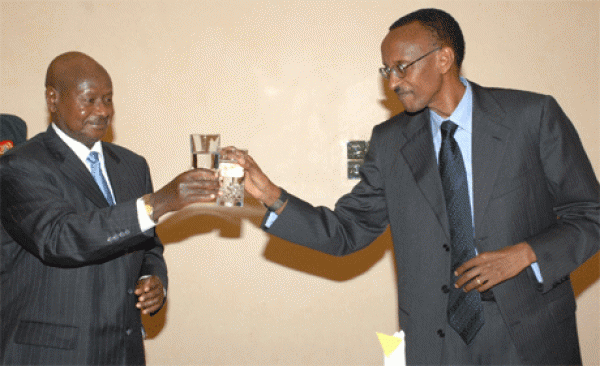
Kagame and Museveni are just two prominent African leaders that have seen an abundance of support from the United States, despite their undemocratic practices.
Last week the Foreign Policy Association released its annual National Opinion Ballot Report regarding several topics within the realm of U.S. foreign policy. One subject that received much attention surrounded the United States’ role and responsibility when it came to promoting democracy globally. When the participants were asked if “The United States should actively promote democracy around the globe”, a substantial 72% either strongly agreed or agreed with this notion. But has the U.S. been an avid promoter of democratic governance worldwide?
After the fallout from World War II and the quick division between the allied powers, separated by political ideologies and practices, the idea of promoting democracy to save the world from communism became prominent. This was cited as a reason to go to war in Vietnam.
In 1984, Ronald Reagan stated that “Democracy is worth dying for because it’s the most deeply honorable form of government ever devised by man”. This statement, made on the 4oth anniversary of D-Day on the northern coast of France, would serve as a precursor to what would become the final years of the Soviet Union.
In 2003, this rationalization was used again to help push the invasion of Iraq and free the people from the tyranny of Saddam Hussein. However, as history has shown, the United States has a less than definitive record when dealing with or promoting democratic governments in the free world. Nowhere is this more evident than in Africa.
During the Cold War period and the global confrontation between democracy and communism — or more accurately between the U.S. and the Soviet Union — the idea of pushing freedom became more of a sound byte for the benefit of the American people than an actual consistent policy. It remained a much more important strategy to help a leader rise to power and maintain them as an ally against the USSR, regardless if their agenda was to promote democratic governance or a blanket dictatorship, as long as they did not align themselves with the Iron Curtain.
In North Africa, the U.S. assisted the U.K. in helping put Muammar Gaddafi in power in Libya in the late 1960’s. Also, it is not secret that the U.S. was a strong supporter of the Mubarak regime in Egypt for 30 years as well, despite his abysmal human rights record. In addition, in the Congo, the United States — by way of the CIA — went a step further, teaming with the Belgians and local Congolese conspirators to assassinate Prime Minister Patrice Lumumba — the hero of Congolese independence from brutal colonial rule — for attempting to gain Soviet assistance in 1961. Then, they proceeded to back the reign of Joseph Mobutu Sese Seko for 30 years, as he renamed the country Zaire and arrested or murdered anyone who opposed him. During his time in power, Mobutu redefined the term “kleptocracy”, embezzling approximately $5 billion from the country’s coffers.
These tendencies for shaky African democracy promotion have not subsided, even in the 21st century. Two of the U.S.’s strongest allies on the continent over the past two decades, Uganda and Rwanda, possess very poor democratic records.
Since the end of the civil war in Rwanda in 1994, Paul Kagame has been the real power inside the government, operating more as a dictator than a democratically elected president. Kagame keeps his opposition silent by ruling with an iron fist. According to Amnesty International, freedom of speech in Rwanda is highly restricted inside the country. Yesterday, the opposition leader, Victoire Ingabire, was given an eight-year prison sentence for reasons many are calling “politically motivated” in an attempt to silence her. She questioned why no Hutu victims were mentioned in the genocide memorial, as many moderate Hutus were slaughtered alongside Tutsis in the tragic 100 day genocide in 1994. Also, President Kagame received 93 percent of the vote in the most recent elections, an overwhelming number for a truly “democratic” state. Despite acknowledging that the tiny Central African nation was not run democratically, it took accusations that Rwanda was financing rebels in the Democratic Republic of Congo for the United States to back off of its unwavering support for the regime, and then only slightly.
Uganda’s commitment to democracy has also been frequently called into question. President Yoweri Museveni has ruled since 1986 and recently his elections have been marred by accusations of bullying and voter fraud to obtain the majority. Transparency International, a Berlin-based global coalition against corruption released it annual Corruptions Perception Index for 2011, which measures how corrupt each countries public sector is perceived to be. Uganda rank 143 out of 182 with a measly score of 2.4, signaling that the country is considered “highly corrupt”, yet they remain one of the primary beneficiaries of USAID annually. Museveni was once touted as a new model leader by the West. While his support has been slipping as of late, he remains a vital ally in the war against the Muslim extremist organization al-Shabaab in Somalia– who maintains strong ties to al-Qaeda — and as the leader in the fight against Joseph Kony’s Lord’s Resistance Army. However, this only further enforces the sentiment that a useful ally is more important that the promotion of democracy.
These are just two cases in Africa of U.S. support for authoritarian regimes. The unfortunate reality is that this practice is rather common.
Promoting democracy across the globe is a daunting task and one that is simply not realistic in some cases. Nevertheless, the U.S. needs to tread carefully when claiming to promote democratic governance internationally, as their record abroad paints a very different picture.